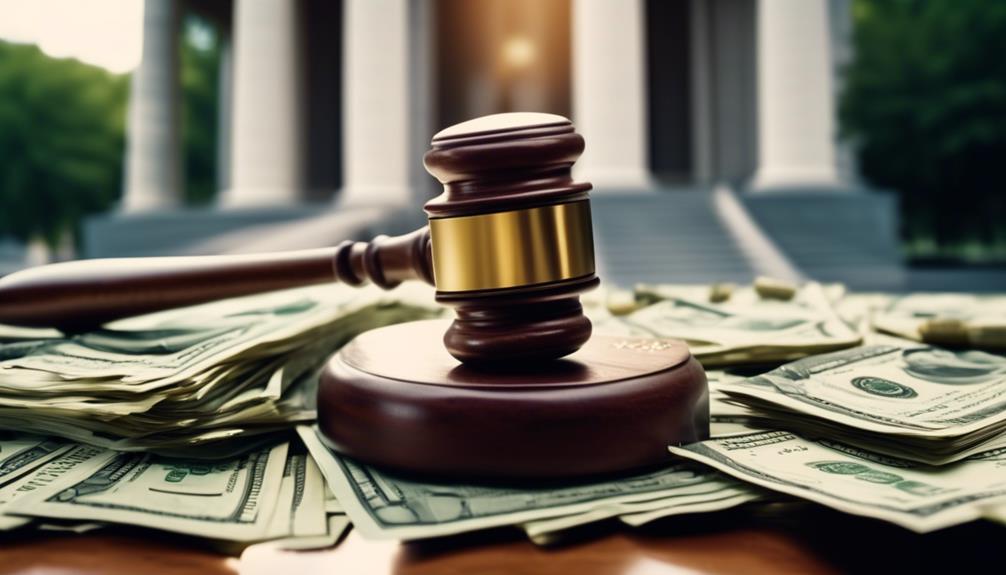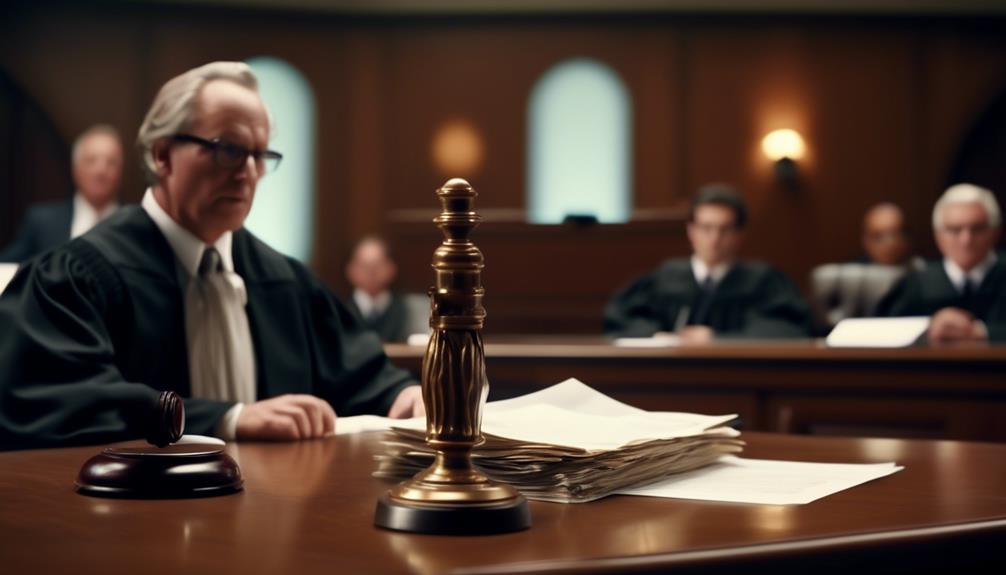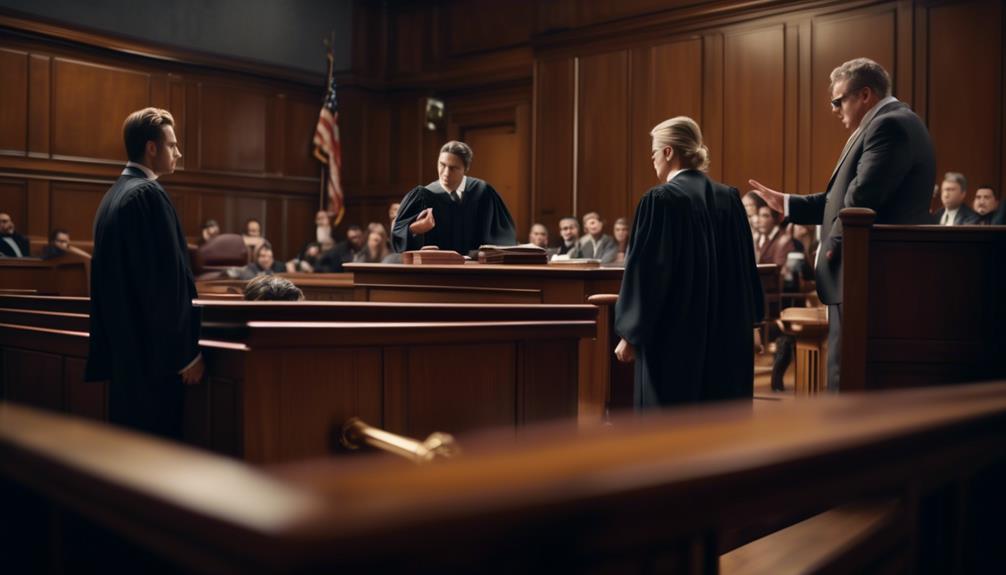In the realm of legal battles, the pursuit of justice often comes with a price tag. Many individuals find themselves at the crossroads, contemplating whether it is worth the financial investment to sue someone. The cost of initiating a lawsuit involves more than just attorney fees; it encompasses a multitude of expenses, ranging from filing fees to court costs and even expert witness fees. However, understanding the full scope of these costs is essential before taking the leap into the intricate world of litigation. By shedding light on the various components that contribute to the overall expenses, this discussion aims to provide clarity on the question that lingers: how much does it truly cost to sue someone?
Key Takeaways
- Filing fees and court costs are incurred when initiating a lawsuit and cover administrative expenses.
- Attorney's fees can be a significant expense in a legal battle and vary depending on complexity, experience, and location.
- Expert witness fees should be considered as they can vary based on expertise, complexity, and trial location.
- Miscellaneous expenses such as court reporter fees and travel expenses can impact the overall cost of a lawsuit and should be budgeted for.
Filing Fees

Filing fees are a mandatory cost incurred when initiating a lawsuit, and they vary depending on the jurisdiction and the type of case. The court filing process involves submitting legal documentation to the appropriate court, which is essential for initiating a lawsuit. However, before proceeding with the court filing process, it is crucial to understand the legal documentation requirements and the associated filing fees.
When initiating a lawsuit, the court requires certain legal documents to be filed, such as a complaint or a petition, which outline the claims or grievances of the plaintiff. These documents provide the necessary information for the court to understand the nature of the case and the relief sought by the plaintiff. Additionally, supporting documents, such as evidence, affidavits, or expert opinions, may also be required depending on the jurisdiction and the complexity of the case.
Once the necessary legal documents are prepared, they need to be filed with the court. This involves submitting the documents to the court clerk, who will review and accept them for filing. However, each court has its own set of rules and procedures, and it is essential to adhere to these requirements to avoid any delays or rejections.
Along with the legal documentation, filing fees are also required to be paid at the time of filing. These fees vary depending on the jurisdiction and the type of case. They are intended to cover the administrative costs associated with processing the lawsuit and maintaining the court system.
Attorney's Fees
To further understand the costs associated with suing someone, it is important to consider the potential impact of attorney's fees. When engaging in a legal battle, it is common for individuals to seek legal representation to navigate the complexities of the legal system. However, hiring an attorney can be a significant expense that needs to be factored into the overall cost of pursuing a lawsuit.
Attorney's fees vary depending on various factors, including the complexity of the case, the experience and reputation of the attorney, and the location. Hourly rates for attorneys can range from $100 to $1,000 or more, with the average being around $250-$350. In some cases, attorneys may charge a contingency fee, where they receive a percentage of the final settlement or judgment if the case is successful. This arrangement can be particularly beneficial for individuals who may not have the means to pay for legal representation upfront.
It is crucial to have a clear understanding of the attorney's fee structure before hiring legal representation. Some attorneys may require a retainer, which is an upfront fee to secure their services and cover initial expenses. This retainer can range from a few thousand dollars to tens of thousands, depending on the complexity of the case.
Additionally, it is essential to consider the potential additional costs associated with legal representation, such as court filing fees, expert witness fees, and other miscellaneous expenses. These costs can quickly add up, further increasing the financial burden of pursuing legal action.
Court Costs

Court costs are an additional financial consideration when pursuing a lawsuit. These costs are separate from attorney's fees and can vary depending on the jurisdiction and complexity of the case. It is important for individuals to understand the potential court fees and legal expenses they may incur during the litigation process. Here are some key points to consider:
- Types of court fees:
- Filing fees: These are fees paid when initiating a lawsuit and vary depending on the type of case and court jurisdiction. The amount can range from a few hundred dollars to several thousand dollars.
- Service of process fees: These fees cover the cost of serving legal documents to the opposing party. Process servers or law enforcement officers are typically responsible for this task, and the fees can range from $50 to $100 per service.
- Motion fees: If either party files a motion during the course of the lawsuit, there may be additional fees associated with it. The amount varies, but it is important to consider these potential costs.
- Additional legal expenses:
- Attorney's time: While attorney's fees were discussed in the previous subtopic, it is essential to consider that court proceedings require significant time and effort from legal professionals. This time will be billed at the agreed-upon hourly rate.
- Expert witness fees: In some cases, expert witnesses may be necessary to provide specialized knowledge or opinions. These experts typically charge for their time and expertise, which can add to the overall legal expenses.
- Transcript fees: If a trial or hearing is transcribed, there may be fees associated with obtaining a copy of the transcript. These fees can vary depending on the length of the proceedings.
Understanding the potential court fees and legal expenses is crucial when evaluating the financial implications of pursuing a lawsuit. It is advisable to discuss these costs with an attorney and carefully consider the potential financial impact before proceeding with legal action.
Expert Witness Fees
Expert witness fees are an essential consideration when assessing the financial implications of pursuing a lawsuit. In legal proceedings, expert witnesses play a crucial role in providing specialized knowledge and opinions to assist the court in understanding complex issues. These individuals are typically professionals with expertise in a specific field relevant to the case, such as medicine, engineering, or finance. Their testimony can significantly impact the outcome of a trial, making their fees an important factor to consider.
Several factors influence the fees charged by expert witnesses. Firstly, the level of expertise and experience of the witness can affect the cost. Highly regarded professionals with extensive experience in their field may command higher fees compared to those with less experience or a lower level of expertise. The complexity of the case is another determinant of expert witness fees. Cases involving intricate technical or scientific matters may require more extensive research and preparation, resulting in higher fees.
The amount of time required from the expert witness is also a significant factor. Some cases may only require a short period of testimony, while others may require the expert witness to provide ongoing consultation and support throughout the entire legal process. Additionally, the location of the trial and the reputation of the expert witness can impact their fees. Experts who are in high demand or who need to travel long distances to testify may charge higher rates to compensate for their time and expenses.
It is important for individuals considering a lawsuit to carefully evaluate the potential costs associated with expert witness fees. While these fees can vary significantly, understanding the factors that influence them can help individuals make informed decisions regarding their legal strategy and budget.
Other Miscellaneous Expenses

Other miscellaneous expenses incurred during the course of a lawsuit can further contribute to the overall cost of litigation. While expert witness fees were discussed in the previous subtopic, there are other hidden costs that plaintiffs and defendants should be aware of. These miscellaneous expenses can vary depending on the complexity and duration of the case, but they are important to consider when budgeting for legal proceedings. Some of these expenses include:
- Court filing fees: When initiating a lawsuit, plaintiffs are required to pay court filing fees. These fees can vary depending on the jurisdiction and the type of case being filed. It is essential to research and understand the fee structure of the specific court where the lawsuit will be filed.
- Service of process fees: Serving legal documents, such as summonses or subpoenas, to the parties involved in the lawsuit often requires the assistance of a professional process server. These fees can add up, especially if multiple parties need to be served throughout the course of the litigation.
- Document production costs: In many lawsuits, both parties are required to exchange documents and evidence during the discovery process. This can involve making copies of documents, organizing and indexing them, and potentially hiring a document production service to handle the large volume of paperwork.
It is crucial to factor in these miscellaneous expenses when assessing the overall cost of a lawsuit. While they may seem insignificant compared to legal fees or settlements, they can quickly add up and impact the financial aspect of the case. Being aware of these hidden costs and budgeting accordingly can help parties involved in a lawsuit better manage their finances and avoid any unexpected financial burdens.
Frequently Asked Questions
What Are the Common Reasons People Sue Someone?
Common reasons people sue someone include personal injury cases, such as car accidents or slip and falls, where negligence or intentional harm is involved. Other types of lawsuits include employment disputes, such as wrongful termination or discrimination claims, contract disputes, and medical malpractice cases. The steps involved in a lawsuit typically include filing a complaint, discovery, settlement negotiations, and, if necessary, going to trial. It is important to consult with a lawyer to determine the appropriate course of action for your specific situation.
How Long Does a Typical Lawsuit Process Take?
The average duration of a typical lawsuit process varies depending on the complexity of the case and the court's caseload. On average, it can take several months to several years for a lawsuit to reach its conclusion. The stages involved in a lawsuit typically include filing a complaint, discovery, settlement negotiations, trial preparation, and finally, the trial itself. It is important to note that this timeline can be affected by various factors, such as the willingness of both parties to cooperate and the availability of court resources.
Are There Any Alternatives to Suing Someone That Can Be Considered?
When considering legal disputes, it is important to explore alternatives to traditional lawsuits. Mediation and arbitration are two such alternatives that can be considered. Mediation involves a neutral third party who helps facilitate communication and negotiation between the parties, aiming to reach a mutually agreeable resolution. Arbitration, on the other hand, involves a neutral arbitrator who reviews evidence and makes a binding decision. These alternatives can often provide a more cost-effective and efficient means of resolving disputes, avoiding the expenses associated with traditional lawsuits.
How Can I Determine if Suing Someone Is Worth the Cost and Effort?
When considering whether to sue someone, it is important to conduct a cost benefit analysis to determine if it is worth the cost and effort. Factors such as the potential financial recovery, the strength of your case, and the potential costs involved in pursuing legal action should be considered. Additionally, it is advisable to explore alternatives to suing, such as mediation or arbitration, and to assess the availability of legal aid or pro bono assistance to help reduce the financial burden of litigation.
What Are the Potential Risks and Consequences of Filing a Lawsuit?
Filing a lawsuit can come with potential risks and consequences that extend beyond the financial burden and emotional toll. It is important to consider the impact on personal relationships, reputation, and the potential for counterclaims. Additionally, the length and complexity of the legal process can be time-consuming and require significant resources. Understanding these potential risks and consequences is crucial in determining whether pursuing a lawsuit is worth the cost and effort.
Conclusion
In conclusion, pursuing legal action against someone can involve several costs, including filing fees, attorney's fees, court costs, and expert witness fees. These expenses can quickly add up and vary depending on the complexity of the case. It is important to consider these factors and weigh them against the potential outcome before deciding to sue someone. Legal battles can be likened to navigating a treacherous terrain, where one must tread carefully and be prepared for the potential financial burdens that may arise.

